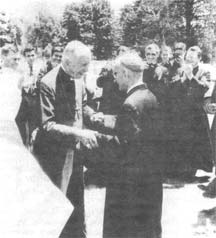Interview with Archbishop Marcel Lefebvre
Conclusion
|
In last month's Angelus the first part of this two part interview appears.
|
Fideliter: The bishops you chose have been exercising their ministry for a year now. Has everything gone for them as you wished, and in accordance with the directives you gave them in the letter you wrote almost a year before the consecrations took place?
Msgr. Lefebvre: So far it seems to me that everything is going well. Care is being taken that nobody can accuse us of trying to give our bishops any sort of territorial jurisdiction, that no one bishop is attached to any particular area. Of course, it seems more natural that a French bishop should minister to the French, a German-speaking bishop to the Germans, and so on, but we are making a point of switching them around now and again so as not to provide any excuse for criticism. Though it is only natural, therefore, that Bishop Williamson should normally administer Confirmation in the United States, Bishop Fellay has also been there to do it, at St. Mary's, so it cannot be said that the U.S.A. is Bishop Williamson's territory. Bishop Fellay has also been to South Africa, to South America and to Zaitzkofen in Germany So you see, we are taking pains to maintain firmly this principle of not allocating territory to the bishops. They are there to ordain and to confirm, to take my place and to do what I have done over the years.
For all other purposes it is, of course, the District Superiors who are appointed to particular areas and who, whenever possible, go to the aid of souls who call on them. Because those souls are entitled to the sacraments and the Truth, are entitled to be saved, we go to their assistance. And it is their call which confers on us the right, provided for in Canon Law, to go and minister to them.
I think, then, that we may thank God that all has gone well. The echoes which come back to us from the faithful show that they are satisfied and are pleased to welcome our bishops.
Of course it was painful to lose a few priests and seminarians, but rather as with the Chartres pilgrimage, we should be grateful that God has allowed those who are not fully in agreement with us and do not understand our struggle to leave us. We are stronger thus, and our actions more decisive. Otherwise we should have people constantly criticising and disagreeing with us even within our own ranks, and that would lead to division and disarray.
As Fr. Schmidberger underlined in the last issue of "Fideliter," our seminaries have had good intakes, and so have the Society's sisters and the other nuns, so we are not experiencing the serious repercussions in the shape of heavy losses which some people had prophesied and led us to fear.
Fideliter: You recently met with Cardinal Thiandoum, at his request. Was he attempting to open the way to a reconciliation?
 Cardinal Joseph Ratzinger |
Msgr. Lefebvre: It's true that he insisted on my going to see him when he was at Neuilly, with the Sisters of St. Thomas of Villanova, so I went. He is still very friendly and affectionate, but at the moment there is absolutely no overture of any kind from Rome, from Cardinal Thiandoum, or from any other cardinal.
As always, I find that actions speak louder than words. People say to me, "You really ought to write a major letter to the Pope." But we've been writing letters for twenty years and got nowhere! I say again: actions, not words. Let Rome see a seminary founded, priories and schools opened, nuns flocking to more and more convents: that is the only way to force them to negotiate. It isn't a question of my presence, but of our foundations and our work. Rome is well aware that it is no small thing. The bishops start to get upset when we move in here or there, so they complain to Rome, and then Rome knows.
So I don't think the time is right to make any approach to Rome just yet. I believe we must wait, and unfortunately that means waiting for the situation to deteriorate even further on their side. But as yet they are not prepared to admit it.
Fideliter: If Rome had been prepared to give you just one bishop the protocol could have led to an agreement, so it is amazing that this concession was refused. It would not have been a big one. After all, one bishop out of almost 3,000 in the world isn't much.
Msgr. Lefebvre: Yes, it is extraordinary, and the only explanation is their fear of Tradition. It's unbelievable, but they are afraid to have even one bishop working against the conciliar errors, and they won't tolerate it.
Fideliter: What do you think of Cardinal Ratzinger's instruction instituting the oath of fidelity, and of the profession of faith which it contains?
Msgr. Lefebvre: First of all there is the Credo, which presents no problem, as it has been left untouched. Nor does any difficulty arise with the 1st and 2nd paragraphs, which are standard Catholic theology. The 3rd, however, is very bad. It aligns itself fundamentally with the universal thinking of today's bishops. In fact the preamble clearly indicates that this paragraph was added in the light of the spirit of the Council. It refers to the Council and to today's so-called magisterium, which is that of the conciliarists. They ought to have added the words, "...in so far as the magisterium conforms fully with Tradition."
As it stands, this formula is dangerous, which just goes to show the mentality of these people with whom it is impossible to come to an agreement. It is utterly absurd and untrue to hold up this oath of fidelity, as some have done, as a resurgence of the Anti-Modernist Oath, suppressed since the Council. The poison is all in the 3rd paragraph, which seems to have been designed deliberately to force those who have been won over to sign this profession of faith and to declare their full accord with the bishops. It is as though at the time of the Arian heresy someone had said, "There, now you are in full agreement with the thinking of the Arian bishops."
No, I am not exaggerating. It is made quite clear in the introduction. It's a swindle. We may wonder whether Rome wouldn't have wanted to alter the text of the protocol in the same sense. Although we found it less than satisfactory, article 3 of the doctrinal declaration still seemed too much in our favour, as it didn't adequately express the necessity of our submitting to the Council. I think what they've done now is to put that right. No doubt they are going to make all the ordinands and priests of the Society of St. Peter sign these texts, which means obliging them to submit formally to the Conciliar bishops. That's the way their minds work, and there's no changing them.
Fideliter: In conclusion, have you any doubts? Is there anything you regret?
 Archbishop Marcel Lefebvre meets with Bishop Antonio de Castro Mayer. |
Msgr. Lefebvre: No, nothing at all. I honestly believe that it has all been guided providentially, and almost miraculously. A lot of people tried to rush me, saying, "You're getting older, what will happen to us if you die?" I could have consecrated bishops three or four years ago, and it wouldn't have been unreasonable. But I believe God wanted the situation to develop gradually to show Rome that we had done everything we possibly could to get genuinely Traditional bishops with their authorisation. Even as the protocol was signed Rome refused to give us those bishops, and even had we persevered further we should have had no end of difficulties. I am sure I made the right decision and that we had really reached the very end of the line with Rome. Our dear Bishop de Castro Mayer is so weak now that he can no longer say his Mass; and that less than a year after the consecrations. I truly think it was a miracle that he should travel all that way, make his wonderful profession of Faith, and agree to co-consecrate our bishops with me—a real miracle! The press didn't appreciate the importance of his presence, but for me and for the new bishops it was a very special grace. The fact that they were consecrated by two bishops is very important.
As for myself, I am feeling well, and there is nothing seriously wrong with me, but even so I tire quickly, and I'm going to have to give up even those ceremonies which I still do take on because I'm just not strong enough any more. I couldn't travel around the world now the way I used to. They are pressing me to go back to Argentina, and to the United States to see the new seminary at Winona, but there are limits, and I just can't do it any more. Nowadays I only accept engagements that aren't tiring—blessing a chapel, a clothing for the Carmelites, attending a priest's first Mass—really very little compared with what I used to do. I feel very strongly that for me, too, June 30th last year was the deadline. I believe it was God's will that events should unfold as they did. Everyone who was present at the consecration ceremony has wonderful memories of it. It was all providence.
My hope now is that the numbers of the faithful will keep on growing, and that they will open their eyes and finally see where the Truth lies, that salvation is to be found in Tradition, not in the Conciliar Church, which is becoming more and more schismatical.
Fideliter: You know, of course, that your name has been left out of this year's "Annuario Pontifico?"
Msgr. Lefebvre: But I don't think it's been left out of God's "Annuario," at least I hope not... and that's what matters.
